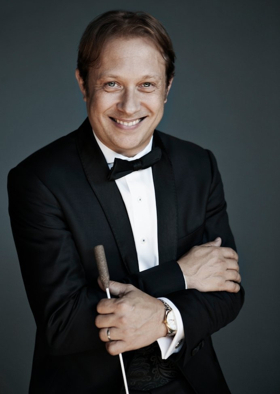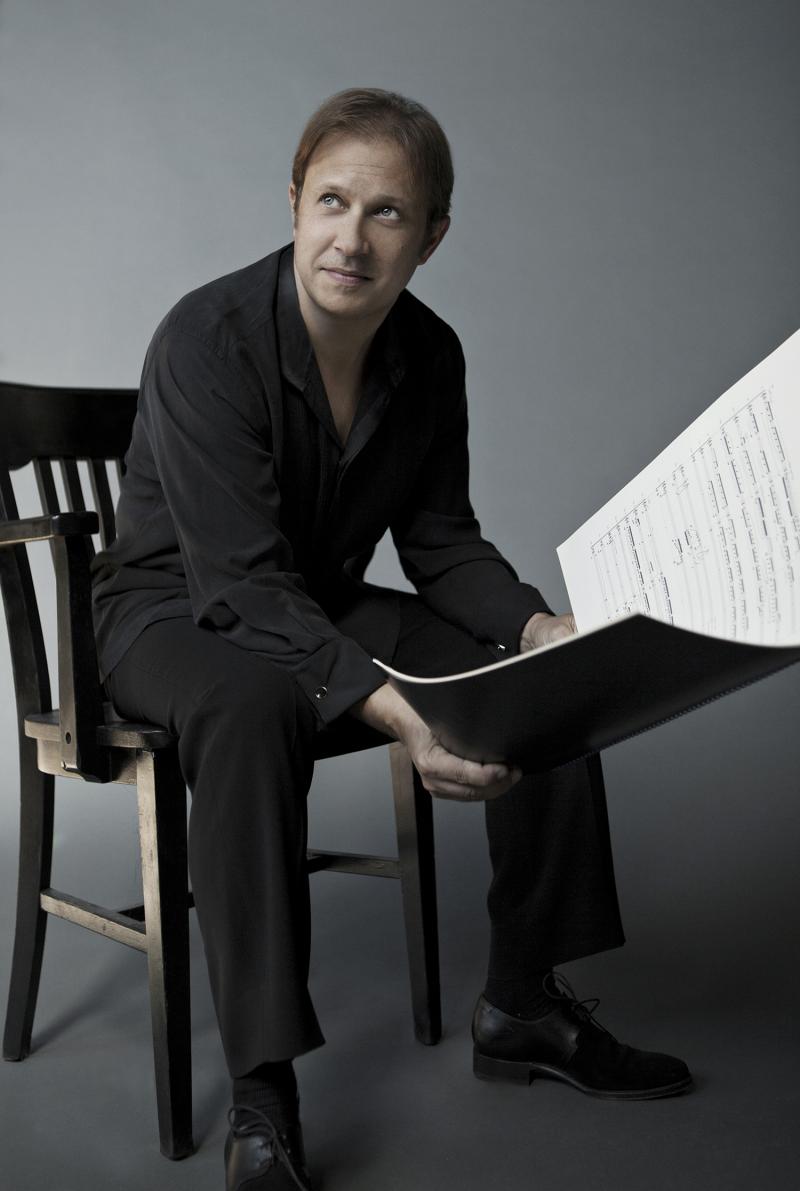Interview: Ludovic Morlot, Part 1: The Importance of Being Berlioz

On Feb. 24, 2018, Seattle Symphony Music Director Ludovic Morlot will make his Seattle Opera debut in Berlioz's rarely performed comic opera Béatrice et Bénédict, based on Shakespeare's delightful comic romp Much Ado About Nothing. Written relatively late in Berlioz's career, the so-called "feather-light one-act divertissement - a caprice written with the point of a needle" embodies the composer's love for the Bard. Morlot had much to say about his relationship with this French music master.
Erica Miner: Congratulations, Maestro, on your Seattle Opera conducting debut!
Ludovic Morlot: Thank you. It's not for lack of trying. With Speight (Jenkins) we tried many times, we had many ideas. He made it very clear to me, which I really appreciated, that he wanted artists to be there from day one of the production, so the schedule was a challenge. We tried again with Aidan (Lang) and finally we could find that window of time, in a year when I really wanted to focus on the music of Berlioz, and the anniversary of Shakespeare throughout town.
EM: So, you chose Béatrice et Bénédict because of the Shakespeare connection?
LM: Yes, in part, but I love Berlioz as you know. With the Symphony we wanted to focus on his earlier works. We started with his Requiem, Symphonie Fantastique and Les Nuits d'été, all music from under the age of 30, really. We've had opportunities in the last few years to do the middle stuff - Damnation, Roméo. Béatrice et Bénédict is one of the last things he wrote. I felt in my last season it was a nice way to find that balance between very young and visionary. Not only innovative, but a revolutionary voice. He started being ambitious with new ideas like Beethoven was at the end of his life. Beethoven came to that in maturity. Berlioz goes back to something classical in Béatrice - an orchestra smaller than he ever used before, and a play that's centuries old, a classic and a comedy. It's very funny that he would go that way. Very interesting arc.
EM: You have a special relationship with Berlioz.
LM: For me Berlioz has always been a more important composer than people give him credit for. He did so many new things that opened the way to Romanticism in the symphony. The fact that he writes for different groups in different parts of the hall is a very new idea. The use of the space, like in the Requiem, Troyens, it's everywhere. Symphonie Fantastique with the distant oboe - that's actually where Mahler takes it from. I don't think Mahler invented this, I think it's just by reading the orchestration treatise of Berlioz and getting the idea. And of course, the literary inspiration, Byron, Shakespeare, Goethe - this is a very 19th century idea, that Schumann, Liszt and Mendelssohn adopted. In some ways for me Berlioz is as much of an innovator as Beethoven was, for many different things. Not so much the harmonic language, which is a world of its own, but more for this kind of invention - the influences and inspirations that would be reproduced by his fellow composers.

EM: Béatrice started as a kind of divertissement. I love the overture, but I've never heard the whole opera. He wrote it in French, based on Shakespeare, but then it was performed in Germany. Why is it done so infrequently?
LM: [Laughs] It's good you mentioned that, because this is the one point that made me agree to do it in English. At first, I was contemplating the singing in French and the dialogue in English because we're having actors as well. But then I thought, he was fine with the performances in German, and it was a great success, and it's Shakespeare after all. There are enough historic points to validate doing it in English. We decided to rewrite the dialogue, because the Berlioz dialogue is quite weak.
EM: Because of the language?
LM: Because of the translation, mostly. The dialogue is a problem. He was a great writer but I think he might have done this a little quickly, so I'm glad we're going back to the Shakespeare play, which I think will make it more appealing. Also, you think Berlioz and you think big -Troyens and Cellini. Béatrice is much more intimate. We don't associate that with Berlioz. That makes it appealing to me, especially that it comes at the end of his life. There are so many subtle touches. I also find it very difficult. It's one of the reasons it's not done very often. And rhythmically quite complex. Vocally it can be uncomfortable to sing Berlioz, because the instrument would try to replicate the voice and in that case it's often the reverse. It's written for a very virtuoso orchestra, and sometimes not as rewarding in the pit. Even the overture is very challenging, not done often.
EM: A lot of stops and starts, great delicacy.
LM: It's a scherzo. Nothing more difficult to play than music in one, you know? A lot of the musical numbers have that rhythmic complexity that sometimes singers are not that skilled to embrace the rhythmic challenges. I think that's why some singers stay away from it. In the pit, we are always confronting different kinds of issues when it comes to ensemble. When you stage a comedy, you want a lot of action and rhythm onstage so that makes it even harder to synchronize. When I worked with (director) John Langs we decided to give a little more depth to some of the characters. We added a few numbers, in some ways very controversial, but I feel good about those because we borrowed from Berlioz's earlier works. Cellini - a whole new revenge aria for Claudio - then from Damnation of Faust we added a little aria for Somarone, "Voici des roses" on the text, "Sigh no more," and a number for the chorus from L'enfance du Christ. I think it gives more depth to those little roles.
EM: That will make the actors very happy.
LM: True. We worked a lot to find the right addition to the music underscoring the dialogue. What's not so successful about doing it as Berlioz wrote it - it becomes like a "number" opera, which can be fun but with Shakespeare we needed more continuity. I underscore the music with dialogue, or start the music as the dialogue is ending. At the very end of the first act, when Hero is caught in a kind of sinful act, whenever in the dialogue you have Don John and Borachio being bad, I reemphasize that music; even if it's not conscious, you have that memory.

EM: It's very subtle. I hope the audience gets it.
LM: I think they will. Our aural memory is quite strong. It will be quite interesting to have those little reminiscences of the music linking back to the story.
EM: Can you possibly compare Béatrice to Berlioz's other three big operas?
LM: Not at all. Every one of these pieces is a different universe. I wouldn't even put Cellini and Troyens in the same bag, though they're big and based on legends from the past and somewhat the same part of the world. For me Damnation and Roméo et Juliette are more like concert works. He called Damnation "légende dramatique" and Roméo "symphonie dramatique." Something dramatic about it, theatrical, but I don't think they are visual enough to be staged.
EM: What about the vocal writing in Troyens and Cellini? They're both pretty heavy.
LM: I find his writing for the voice very instrumental. He treats the voice the same way he writes for the violin. So many melodies we find again in the operas are actually in the overtures; Roman Carnival with the cor Anglais you find sung by Cellini. Instead of the instrument trying to replicate the voice, in Béatrice it's often the reverse. You think of Berlioz as a great orchestrator but he didn't play any of the orchestra instruments. He played guitar skillfully and flute very badly, and never had any interest in learning any others - not piano, not violin. It's a curious combination, and what makes him so unique. Yet everybody was reading his orchestration treatise. Quite fascinating. Vocally it can be uncomfortable to sing Berlioz. Beethoven as well. Missa Solemnis, even the 9th, impossible to sing.
EM: Not to mention Fidelio, Florestan's aria.
LM: I think both Beethoven and Berlioz didn't really care about how it would sit on the voice. The Missa Solemnis is a big question mark for me. The piece is great but I'm lost with it. How the soprano can sing this, I still don't understand. I don't know any singers that get pleasure from it. Vocally impossible and not very rewarding. The big violin solo - so hard, yet quite unrewarding.
EM: Wagner certainly didn't care. Look how he tortured both singers and orchestra.
LM: The argument was that they wrote for posterity. People, especially 200 years ago, weren't able to play it anyway. It's a good thing they weren't satisfied with what people were able to play at the time. It would be very unchallenging today. They had this vision of posterity. I think that's remarkable.
Next, Part 2: The Next Chapter
Seattle Opera's Béatrice et Bénédict will be performed at McCaw Hall from Feb. 24 through Mar. 10 (https://seattleopera.org/on-stage/beatrice-benedict/).
Photo credits: Brandon Patoc, Lisa Marie Mazzucco, Deborah Trout
Comments

Videos

